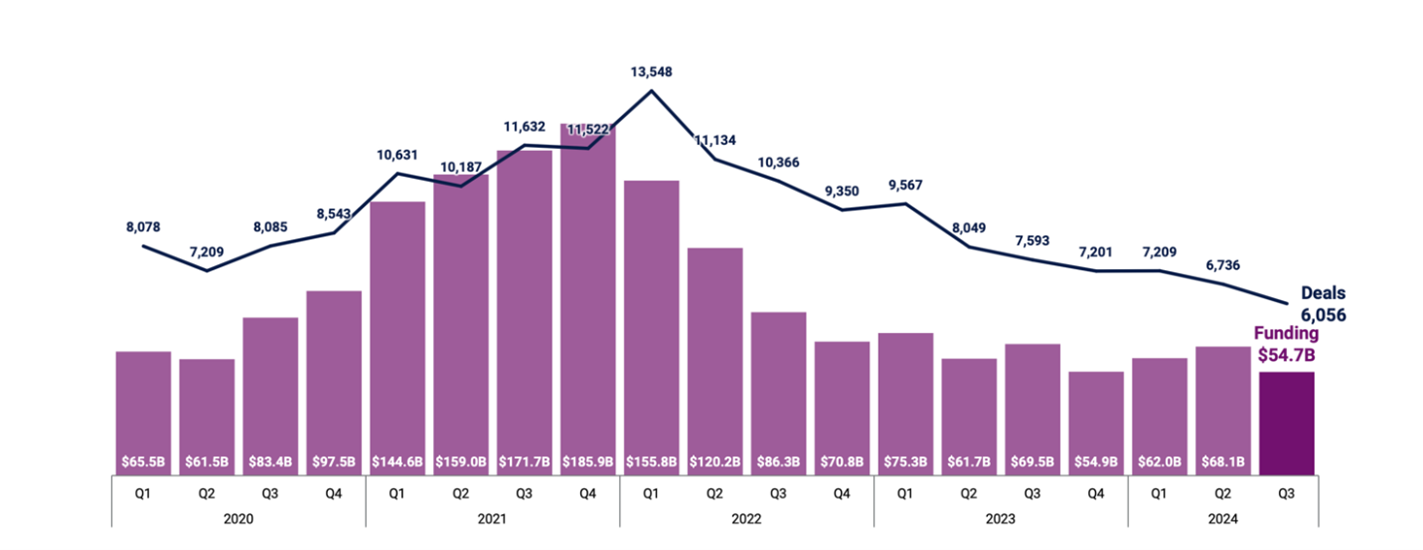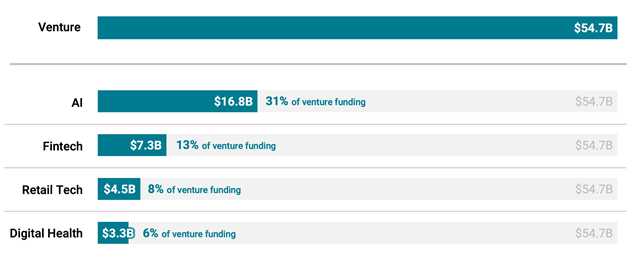Next, Voices from the Future | AI towards 2025: innovations, investments, and Sella’s approach

We are experiencing one of the fastest technological evolutions ever seen, driven by advancements in the broad field of artificial intelligence. As previously discussed, various technologies are leading this new revolutionary wave, poised to create a more efficient and effective world. Artificial intelligence will continue to be a cornerstone of this transformation, both for its ability to radically reshape decision-making processes and for its influence on key sectors such as healthcare, finance, and businesses. This is because, as we know, AI can process massive amounts of data. Additionally, the growing adoption of AI agents will enable these systems to act autonomously in increasingly personalized ways.
In recent years, starting from 2021, VCs have invested heavily in AI. However, despite recorded peaks, the third quarter of 2024 saw a 20% decline in global investments compared to the previous quarter, with around $54.7 billion invested and a projected total of approximately $240 billion for 2024. This indicates a slowdown compared to record years, but the most notable data point is the growing proportion of investments directed towards AI: one in three dollars is allocated to this field, with forecasts suggesting it could rise to 50% in the near future.


VCs are highly attracted to artificial intelligence because startups in this field exhibit faster growth and the ability to achieve tangible results much more quickly than those in other tech areas. While startups in other sectors can take up to 13 years to reach an exit, AI startups take an average of just seven years. This acceleration makes AI particularly appealing to investors, offering a faster return on investment.
Currently, in the international economic landscape, the United States leads in terms of both number and amount of AI investments, representing 43% of global VC transactions in the sector. This dominant position strengthens U.S. role as the epicenter of AI innovation, attracting even more investment and talent. Conversely, in Europe, AI development follows a different path with a strong focus on regulation and ethics. The European Union is currently working on implementing a comprehensive regulatory framework for AI, aimed at protecting fundamental rights and privacy and preventing risks of misuse or discrimination. The Artificial Intelligence Act (AI Act) seeks to create a structure of rules to promote innovation in a safe and responsible context. This emphasis on regulation, while offering greater consumer protection and process transparency, also slows AI adoption compared to the U.S., where a more permissive and rapid regulatory approach prevails. However, by establishing a global standard for AI ethics and safety and promoting responsible innovation, Europe may attract companies and investors interested in operating within a more stable and regulated legal framework.
The Sella Approach to Artificial Intelligence
The Sella Group has defined a clear strategic framework for artificial intelligence, viewing it as a fundamental technology not only to enhance existing products but also to transform the organization radically. This approach requires a true shift in mindset: from solving problems or executing tasks to creating effective prompts that maximize AI support across various processes, thereby improving both the quality and efficiency of activities. This change has implications not only on operations but also in employee training: learning to collaborate with AI means acquiring specific skills, such as formulating clear instructions for AI tools, critically interpreting results, and continuously adapting operational strategies.
The Group AI Competence Center and Sella’s Innovation Area are collaborating along two main lines to fully leverage AI’s potential in the coming years. The first line focuses on customer experience, aiming to revolutionize interactions and create a unique point of reference for clients' financial needs. Through AI, Sella aims to offer personalized suggestions and continuous assistance, available 24/7, ensuring accessible and tailored financial support. The second line focuses on internal process optimization and data management. This strategic area aims to enhance corporate efficiency through digitalization and the automation of internal workflows. By using AI agents, Sella plans to create a data-driven environment in which AI supports employees in more complex decision-making tasks, reducing time and operational costs and improving analysis accuracy.
In conclusion, artificial intelligence increasingly represents a transformative lever for industries and companies that strategically and responsibly adopt it. While the U.S. and Europe take different paths toward innovation - one rapid and permissive, the other ethically regulated - it is clear that AI will continue to reshape the global economic landscape. For Sella, AI is much more than just technology; it is a strategic resource to enhance customer experience and optimize internal processes, helping build an efficient and forward-looking organization. Moving toward a future where AI will become the engine of a new banking model: more responsive, personalized, and centered on customer needs.